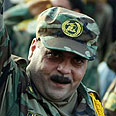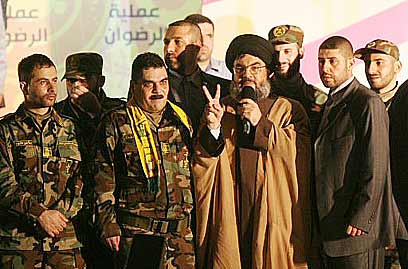
Kuntar. 'Bloodstained terrorist'
צילום: AFP
US papers call Kuntar welcome 'repulsive'
Editorial contributors in US react to warm welcome received by newly released terrorist in Lebanon, calling prisoner swap 'a deal with devils'. British papers critique Israel for mismanaging war, empowering Hizbullah
News agencies in the US heaped criticism on the welcoming ceremonies held in Lebanon in honor of the return of convicted terrorist Samir Kuntar, who was freed from an Israeli prison as part of the prisoner swap deal with Hizbullah, which brought home the bodies of kidnapped soldiers Ehud Goldwasser and Eldad Regev.
"There is something morally repulsive in the hero's welcome given the most famous – or notorious – of the Lebanese prisoners released by Israel," a Boston Globe article entitled "A strange kind of hero" said on Friday.
"This is the creature Nasrallah hailed as a resistance hero, the figure Hamas Prime Minister Ismail Haniyeh called a 'huge hero who sacrificed 30 years of his life for the Palestinian issue,' the celebrity that Lebanon's president and prime minister saluted as a liberated freedom fighter."
The New York Daily News launched the heading "A deal with the devils", and said the injustice of the agreement was "too painful to contemplate. There he was, a terrorist guilty of inhumanity in the extreme, walking free to the cheers of comrades in arms. And there they were, two black coffins bearing the remains of Israeli soldiers, held by Hizbullah for just this purpose.
"To be swapped, the blameless dead for the guilty living. To be traded as chits in conscienceless extortion. To be used in vile celebration of murder. Wednesday's exchange between Israel and Hizbullah could not have been more searing."
The New York Post declared the deal "a shameful exchange", which was also the title of the editorial published on Friday. "Six bloodstained terrorists got a red-carpet hero's welcome," the article read.
"The shameful exchange ended the two-year nightmare for the parents of Ehud Goldwasser and Eldad Regev, who until the coffins were delivered didn't know for certain whether their sons were alive or dead. It also underscored Israel's deeply felt imperative never to abandon soldiers in the field."

Nasrallah welcomes Kuntar with ceremonies. (Photo: AFP)
British newspapers were somewhat more reserved in their criticism towards Hizbullah, and more disapproving of Israel's conduct. The London Times' chief foreign commentator, Bronwen Maddox, called the deal "dramatic in its asymmetry", and quoted Prime Minister Ehud Olmert as saying that future deals should be subjected to different guidelines where Israel is concerned.
"(Olmert) suggested, according to reports, that after this deal – and any future one with Hamas for the release of Gilad Schalit, believed to be held alive in Gaza – Israel should work out new guidelines for itself in swaps. He is right," she wrote.
"The time is coming for Israel to extract itself from a commitment that can put it at a disadvantage to its opponents. As critics of the deals have said, they may encourage kidnapping. They may encourage the killing of hostages, if Israel will pay a price to get back the bodies anyway."
The UK's Guardian also criticized Israel's government-based decisions, specifically those surrounding the Second Lebanon War. "That 2006 war was mishandled on all sides," one commentator wrote. Another claimed that "there is an unmistakable sense that Israel, still smarting from its failure to win the war against Hizbullah, has come off second best" in the exchange.
Another of the paper's editorials brought to light the question of kidnapped soldier Gilad Shalit: "Hizbullah, through war and abduction, has achieved the return of prisoners, which all the diplomatic leverage of the Lebanese leader Fouad Siniora has failed to do. This has implications for Hamas. If Israel is prepared to surrender Kuntar… in return for two corpses, what is the rate it is prepared to pay for Gilad Shalit, the Israeli soldier abducted by Hamas, who is still alive?"
Jonathan Webber contributed to this report










